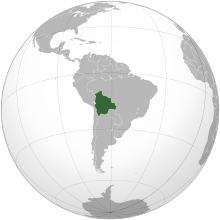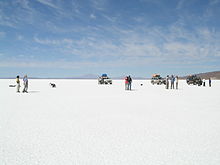Bolivia
- Pikeun kagunaan séjén, tempo Bolivia (disambiguasi).
Bolivia (Basa Spanyol: [boliˈβja]) resminia kawanoh salaku Nagara Multibangsa Bolivia[12][13] (basa Spanyol: Estado Plurinacional de Bolivia, Basa Quechua: Bulivya Mamallaqta, Basa Aymara: Wuliwya Suyu), nyaéta hiji nagara nu dilingkung di Amérika Kidul beulah tengah. Nagara ieu wawatesan jeung Brasil di kalér jeung wétan, Paraguay sareng Argéntina di kidul, Chili di kidul-kulon, sarta Peru di kulon.
| Estado Plurinacional de Bolivia Bulivya Mamallaqta Wuliwya Suyu Nagara Multibangsa Bolivia |
||||||
|---|---|---|---|---|---|---|
|
||||||
| Motto ¡La unión es la fuerza![1] |
||||||
| Lagu Himno Nacional de Bolivia |
||||||
Wiphala atawa Qulla Suyu:[2] |
||||||
 |
||||||
| Ibu kota | Sucre (ibu kota konstitusional)[3][4] 19°2′S 65°15′W / 19.033°S 65.250°W La Paz (ibu kota administratif)[4] 16°30′S 68°09′W / 16.500°S 68.150°W | |||||
| Kota panggedéna | Santa Cruz de la Sierra 17°48′S 63°10′W / 17.800°S 63.167°W |
|||||
| Basa resmi | Basa Spanyol Basa Quechua Basa Aymara jeung 34 basa pribumi lianna[5][6] |
|||||
| Grup étnis | 55% Amerindian (Quechua, Aymara jeung 34 grup étnis lianna) 30% Mestizo 15% Bodas[7] |
|||||
| Démonim | Bolivian | |||||
| Pamaréntah | Républik kahijian présidénsial | |||||
| - | Présidén | Luis Arce | ||||
| - | Wakil Présidén | David Choquehuanca | ||||
| Kamerdikaan | ti Spanyol | |||||
| - | Didéklarasikeun | 6 Agustus 1825 | ||||
| - | Diakuan | 21 Juli 1847 | ||||
| - | Konstitusi nu ayeuna | 7 Pébruari 2009 |
||||
| Aréa | ||||||
| - | Total | 1.098.581 km² (ka-28) 424.163 mil² |
||||
| - | Cai (%) | 1,29 | ||||
| Populasi | ||||||
| - | Perkiraan 2010 | |||||
| - | Sénsus 2001 | 8.280.184 | ||||
| - | Kapadetan | 8,9 /km² (ka-220) 23 /mil² |
||||
| GDP (PPP) | Perkiraan 2010 | |||||
| - | Total | $47,882 milyar[9] | ||||
| - | Per kapita | $4.592[9] | ||||
| GDP (nominal) | Perkiraan 2011 | |||||
| - | Total | $22,778 milyar[9] | ||||
| - | Per kapita | $2.143[9] | ||||
| Gini? (2009) | 58,2[10] (luhur) | |||||
| HDI (2011) | ||||||
| Mata uang | Boliviano (BOB) |
|||||
| Zona wanci | (UTC-4) | |||||
| TLD Internét | .bo | |||||
| Kode telepon | +591 | |||||
Koordinat: 16°42′43″S 64°39′58″W / 16.712°S 64.666°W

Babagian administratif
édit- Artikel utama: Departemén di Bolivia, Propinsi di Bolivia, Kotamadya di Bolivia, Kanton di Bolivia, Lemah Komunitas Pribumi
Bolivia dibagi kana 9 departemén, nu salajengna dibagi kana (total) 112 propinsi nu teras kana (total) 339 kotamadya jeung kana lemah komunitas pribumi.[14]
Tempo ogé
éditBacaan salajengna
édit- Alexander, R. J. (2005) A History of Organized Labor in Bolivia, Praeger Publishers Inc
- Atkinson, D. (2007) Bradt Travel Guide: Bolivia, Bradt Travel Guides
- Crabtree J., and Whitehéad, L. (eds.; 2008) Unresolved Tensions: Bolivia Past and Present, University of Pittsburgh Press
- Dangl, B. (2007) The Price of Fire: Resource Wars and Social Movements in Bolivia, AK Press
- Farcau, B. W. (2000) The Ten Cents War: Chile, Peru and Bolivia in the War of the Pacific, 1879–1884, Greenwood Press
- Farthing, L. and Kohl, B. (2006) Impasse in Bolivia: Neoliberal Hegemony and Popular Resistance, Zed Books
- Gill, L. (2000) Teetering on the Rim: Global Restructuring, Daily Life, and the Armed Retreat of the Bolivian State, Columbia University Press
- Goldstein, D. M. (2004) The Spectacular City: Violence and Performance in Urban Bolivia, Duke University Press
- Gustafson, B. D. (2009) New Languages of the State: Indigenous Resurgence and the Politics of Knowledge in Bolivia , Duke University Press
- Harten, S. (2011) The Rise of Evo Morales and the MAS, Zed Books
- Héaly, K. (2000) Llamas, Weavings and Organic Chocolate: Multicultural Grassroots Development in the Andes and Amazon of Bolivia, University of Notre Dame Press
- Hylton, F. and Thomson, S. (2008) Revolutionary Horizons: Past and Present in Bolivian Politics, Verso
- Jacobs, M. (2006) Ghost Train Through the Andes: On My Grandfather's Trail in Chile and Bolivia, John Murray
- Jemio, L. C. (2001) Debt, Crisis Reform Bolivia: Biting the Bullet, Palgrave Macmillan
- Klein, H. S. (1992) Bolivia: The Evolution of a Multi-Ethnic Society, Oxford University Press
- Klein, H. S. (2011) A Concise History of Bolivia, Stanford University Press
- Kunststaetter, D. and R. (2008) Footprint Handbook: Bolivia, Footprint Handbooks
- Lazar, S. (2008) El Alto, Rebel City: Self and Citizenship in Andean Bolivia, Duke University Press
- Lougheed, V. (2008) Understanding Bolivia: A Traveller's History, Harbour Publishing
- McLaughlin, D. (2008) Bolivia, Fields Publishing
- Morales, W. Q. (1992) Bolivia: Land of Struggle, Westview Press
- Mutic, A.(2010) Lonely Planet Guide: Bolivia, Lonely Planet
- Olivera, O. and Lewis, T. (2004) Cochabamba!: Water Rebellion in Bolivia, South End Press
- Petras, J. (2005) Social Movements and State Power: Argentina, Brazil, Bolivia, Ecuador, Pluto Press
- Postero, N. G. (2006) Now We Are Citizens: Indigenous Politics in Post-multicultural Bolivia, Stanford University Press
- Powers, W. (2006) Whispering in the Giant's Ear: A Frontline Chronicle from Bolivia's War on Globalization, Bloomsbury Publishing
- réad, J. (2008) The Rough Guide to Bolivia, Rough Guides
- Richards, K. (2009) Culture Smart!: Bolivia, Kuperard
- Sivak, M. (2010) Evo Morales: The Extraordinary Rise of the First Indigenous President of Bolivia, Palgrave Macmillan
- Spitzer, L. (1999) Hotel Bolivia: The Culture of Memory in a Refuge from Nazism, Hill & Wang
- Stéarman, A. M. (1989) Camba and Kolla: Migration and Development in Santa Cruz, Bolivia, University Press of Florida
- Suzuki, T. (2010) Embodying Belonging: Racializing Okinawan Diaspora in Bolivia and Japan, niversity of Hawai'i Press
- Webber, J. R. (2011) Rebellion and Reform in Bolivia, Haymarket Books
- Webber, J. R. (2011) Red October: Left-Indigenous Struggles in Modern Bolivia, Brill Academic
- Werner, R. J. (2009) Bolivia in Focus: A Guide to the People, Politics, and Culture, Interlink Publishing
- Young, R. (2004) Marching Powder, Pan
Catetan suku jeung rujukan
édit- ↑ "Central Bank of Bolivia". The Bolivian coin. Diakses tanggal 2006-08-04. Archived 2007-04-28 di Wayback Machine
- ↑ Article 6, section II of the new Bolivian constitution establishes the Wiphala as a national symbol of Bolivia (along with the flag, national anthem and coat of arms). See "Bandera indígena boliviana es incluida como símbolo patrio en nueva Constitución" Archived 2014-11-09 di Wayback Machine, October 21, 2008, United Press International.
- ↑ "Artículo 6. I. Sucre es la Capital de Bolivia."(Article 6. I. Sucre is the capital of Bolivia.)
- ↑ a b CIA - The World Factbook Archived 2018-12-11 di Wayback Machine
- ↑ Bolivian Constitution, Article 5-I: Son idiomas oficiales del Estado el castellano y todos los idiomas de las naciones y pueblos indígena originario campesinos, que son el aymara, araona, baure, bésiro, canichana, cavineño, cayubaba, chácobo, chimán, ese ejja, Guaraní, guarasu'we, guarayu, itonama, leco, machajuyai-kallawaya, machineri, maropa, mojeño-trinitario, mojeño-ignaciano, moré, mosetén, movima, pacawara, puquina, quechua, sirionó, tacana, tapieté, toromona, uru-chipaya, weenhayek, yawanawa, yuki, yuracaré y zamuco.
- ↑ "Kids Encyclopedia". Kids.britannica.com. 8 February 2009. Diakses tanggal 30 August 2010. Archived 10 Méi 2011 di Wayback Machine
- ↑ "The World Factbook – Bolivia". CIA. Diakses tanggal 30 March 2010. Archived 11 Désémber 2018 di Wayback Machine
- ↑ "Bolivia". World Gazetteer. Diarsipkan dari versi asli tanggal 19 January 2013. Diakses tanggal 7 January 2010. Archived 19 Désémber 2010 di Wayback Machine
- ↑ a b c d "Bolivia". International Monetary Fund. Diakses tanggal 8 December 2011. Archived 4 Séptémber 2014 di Wayback Machine
- ↑ "Distribution of family income – Gini index". The World Factbook. CIA. Diakses tanggal 31 August 2011. Archived 13 Méi 2009 di Wayback Machine
- ↑ "Human Development Report 2010" (PDF). United Nations. 2011. Diakses tanggal 9 November 2011. Archived 11 Nopémber 2011 di Wayback Machine
- ↑ "WHO | Bolivia (Plurinational State of)". Who.int. 11 May 2010. Diakses tanggal 30 August 2010. Archived 6 Oktober 2010 di Wayback Machine
- ↑ "UNdata | country profile | Bolivia (Plurinational State of)". United Nations. 14 November 1945. Diakses tanggal 30 August 2010. Archived 2 Juli 2010 di Wayback Machine
- ↑ Konstitusi Pulitis Bolivia, Pasal 269
Tumbu kaluar
édit| Pék paluruh émbaran nu leuwih loba ngeunaan Bolivia ku jalan nyungsi proyék sabaraya Wikipédia | |
|---|---|
| Définisi kamus ti Wiktionary | |
| Buku téks ti Wikibooks | |
| Cutatan ti Wikiquote | |
| Téks sumber ti Wikisource | |
| Gambar jeung média ti Commons | |
| Warta ti Wikinews | |
| Sumber pangajaran ti Wikiversity | |
| OpenStreetMap miboga data géografis nu patali jeung: Bolivia |
- UNHCR: Bolivia references
- World Héalth Organization: Bolivia
- Éntri Bolivia di CIA World Factbook
- U.S. Library of Congress – Bolivia: A Country Study
- Encyclopedia of the Nations: Bolivia
- BBC News: Country Profile – Bolivia
- Lonely Planet: Introducing Bolivia
- Bolivia Weekly Bolivia News Archived 2010-02-27 di Wayback Machine
- U.S. State Department: Bolivia Archived 2010-04-07 di Wayback Machine
- World Trade Organization: Bolivia
- World Atlas: Map of Bolivia
- The Carter Center: Bolivia
- Embassy World: Maps of Bolivia Archived 2012-02-07 di Wayback Machine
- The New York Times: Bolivia News
- The Washington Post: Bolivia Country Guide
- Association of Religion Data Archives profile: Bolivia Archived 2011-04-13 di Wayback Machine
- Languages of Bolivia
- Bolivian Information Forum
- LANIC Bolivia page
- Bolivia: Legacy of the Chaco War
- Bolivia: Photos and Postcards
- Bolivia Economy Archived 2011-10-19 di Wayback Machine
- Complete information on Bolivia
| Artikel ngeunaan géografi ti hiji nagara atawa wewengkon ieu mangrupa taratas, perlu disampurnakeun. Upami sadérék uninga langkung paos perkawis ieu, dihaturan kanggo ngalengkepan. |

